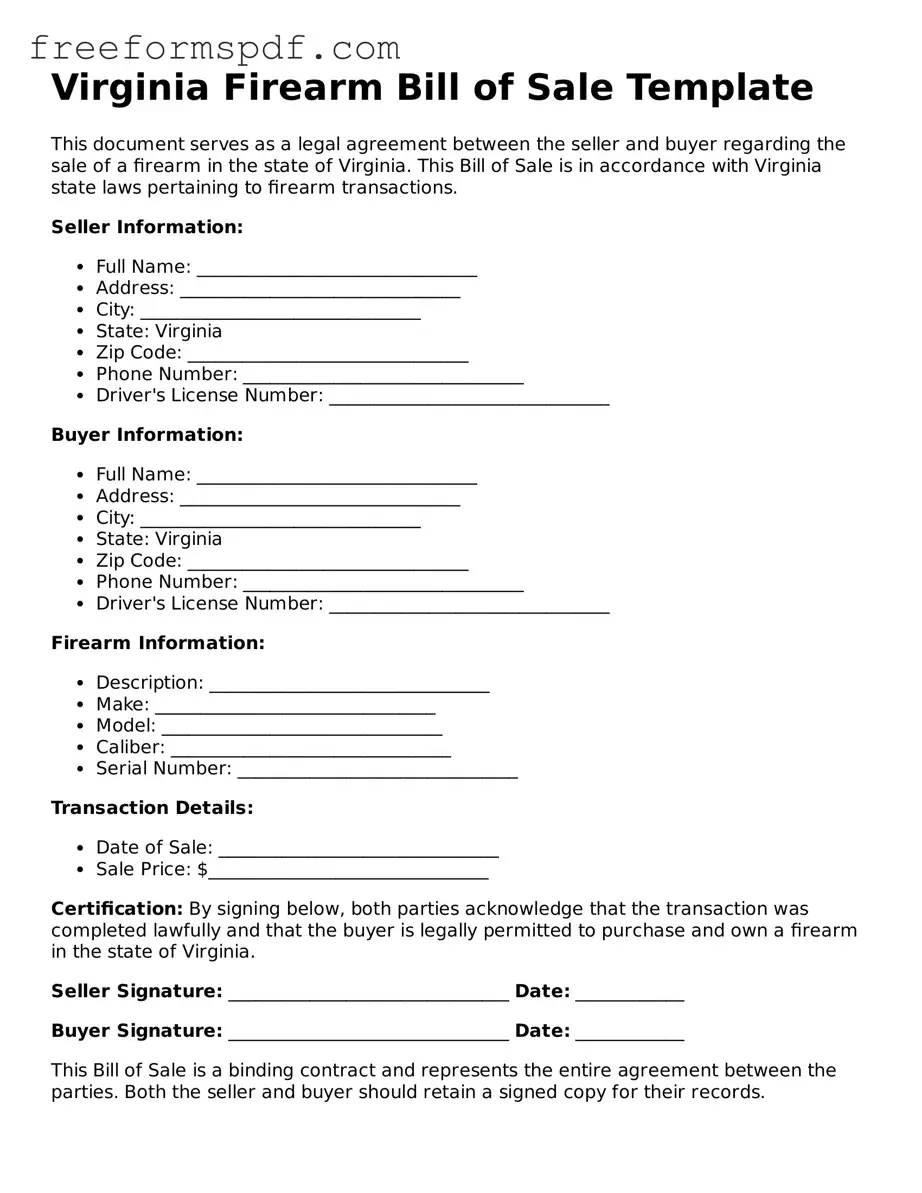Attorney-Verified Firearm Bill of Sale Document for Virginia State
Common mistakes
-
Incomplete Information: One common mistake is failing to provide all required information. Buyers and sellers must ensure that all fields are filled out completely, including names, addresses, and contact information.
-
Incorrect Firearm Details: People often misreport the details of the firearm being sold. This includes the make, model, and serial number. Inaccuracies can lead to legal complications.
-
Not Including Signatures: A valid Bill of Sale requires signatures from both the buyer and seller. Omitting a signature can render the document ineffective.
-
Failure to Date the Document: Some individuals neglect to date the Bill of Sale. A date is essential for establishing the timeline of the transaction.
-
Not Keeping Copies: After completing the form, individuals often forget to make copies. Both parties should retain a copy for their records to ensure clarity in case of future disputes.
-
Ignoring Local Laws: Many people overlook the importance of understanding local firearm laws. Each locality may have specific requirements that must be adhered to in addition to the Bill of Sale.
Learn More on This Form
-
What is a Virginia Firearm Bill of Sale form?
The Virginia Firearm Bill of Sale form is a document used to record the sale or transfer of a firearm between two parties in Virginia. This form serves as proof of the transaction and includes important details about the buyer, seller, and the firearm being sold.
-
Is the Bill of Sale required for private firearm sales in Virginia?
While Virginia law does not require a Bill of Sale for private firearm sales, it is highly recommended. Having a Bill of Sale provides legal protection for both the buyer and the seller, ensuring that there is a clear record of the transaction.
-
What information should be included in the Bill of Sale?
The Bill of Sale should include:
- The names and addresses of both the buyer and seller
- A description of the firearm, including make, model, caliber, and serial number
- The date of the transaction
- The purchase price
-
Do I need to have the Bill of Sale notarized?
No, notarization is not required for the Bill of Sale in Virginia. However, having the document notarized can add an extra layer of authenticity and may be beneficial in case of any disputes in the future.
-
Can I use a generic Bill of Sale template?
Yes, you can use a generic Bill of Sale template, but it’s important to ensure that it complies with Virginia laws. Customizing the template to include all necessary details specific to your transaction is crucial for its validity.
-
What should I do if the firearm is lost or stolen after the sale?
If the firearm is lost or stolen after the sale, the seller should report the incident to local law enforcement. The Bill of Sale serves as proof that the firearm was transferred, which can help clarify ownership issues.
-
Are there any age restrictions for purchasing firearms in Virginia?
Yes, buyers must be at least 18 years old to purchase a firearm from a private seller in Virginia. For handguns, the buyer must be at least 21 years old. Always verify the buyer's age to ensure compliance with state laws.
-
What if I sell a firearm to someone from another state?
When selling a firearm to someone from another state, federal laws and the laws of the buyer's state must be followed. It’s advisable to conduct the sale through a licensed dealer to ensure compliance with all regulations.
Misconceptions
Understanding the Virginia Firearm Bill of Sale form is crucial for both buyers and sellers. Unfortunately, several misconceptions can lead to confusion. Here are five common misunderstandings:
-
The Bill of Sale is not necessary for private sales.
Many believe that a Bill of Sale is optional for private firearm transactions. However, having a Bill of Sale is essential. It provides proof of ownership transfer and can protect both parties in case of future legal issues.
-
Only licensed dealers need to use a Bill of Sale.
This is a common myth. While licensed dealers are required to keep records, private sellers also benefit from using a Bill of Sale. It ensures that the transaction is documented and can help avoid disputes.
-
The form is the same for all states.
Some individuals think that a Bill of Sale is standardized across the country. In reality, each state has its own requirements. The Virginia Firearm Bill of Sale form is specific to Virginia and may differ from those in other states.
-
Filling out the form is complicated.
There is a misconception that completing the Bill of Sale is a complex process. In fact, it typically requires basic information about the buyer, seller, and the firearm. Most forms are straightforward and user-friendly.
-
Once the Bill of Sale is signed, the transaction is final.
While signing the Bill of Sale indicates that the transaction is complete, it does not absolve either party of their responsibilities. Buyers should ensure that the firearm is legally transferable, and sellers should verify the buyer’s eligibility.
By addressing these misconceptions, individuals can navigate firearm transactions in Virginia more confidently and legally.
Some Other Firearm Bill of Sale State Templates
How to Transfer Gun From Husband to Wife - This document can alleviate future ownership disputes by providing clear evidence of the sale.
To facilitate a smooth vehicle transfer, it is essential to utilize a reliable Motor Vehicle Bill of Sale form, which can be accessed easily at newyorkform.com/free-motor-vehicle-bill-of-sale-template/. This document not only serves as proof of the ownership change but also ensures that all necessary details regarding the vehicle and the sale are recorded clearly, protecting both the buyer and the seller in the transaction.
How to Write a Bill of Sale for a Gun - Ensures all necessary information is collected and documented.
